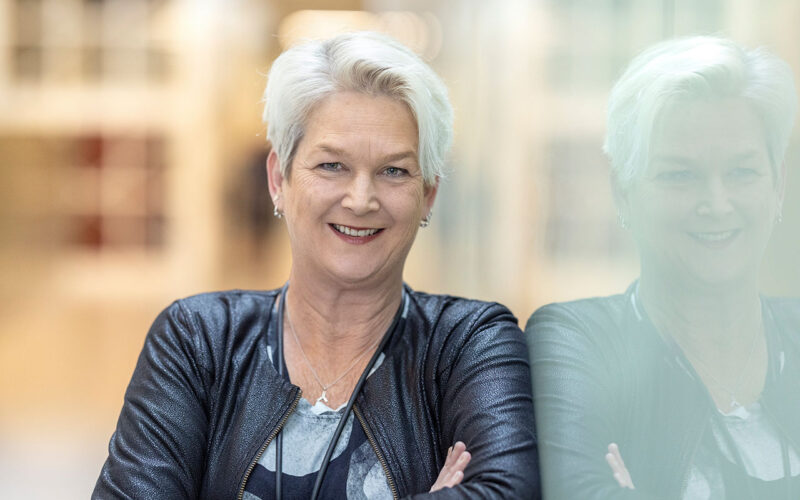On Tuesday, April 9, 2024, Jeanette Leusen, professor of Antibody Therapy at Utrecht University and UMC Utrecht, delivered her inaugural lecture. There she addressed the discovery, development and clinical application of antibodies. Partly due to the research of Jeanette and her group, antibodies based on immunoglobulin A (IgA) also appear to have great potential as a next generation treatment option in cancer, and perhaps also in infectious diseases. A first drug candidate is now ready for the next step: a ‘first-in-human’ study, but this will require more investment.
The development of antibody therapy marks a crucial trajectory in contemporary biomedical science, and embodies a paradigm shift in the treatment of cancer and infectious diseases. In her lecture, Jeanette Leusen highlighted the evolutionary development of antibody therapy, from concept to the latest breakthroughs in immunotherapy, focusing on the potency of IgA antibodies, and their implications for clinical practice and patient care.
Antibodies (also called immunoglobulins) are crucial proteins produced by B cells that can recognize and neutralize specific targets (antigens). These Y-shaped molecules play a key role in the specific immune response, either by directly neutralizing pathogens or by facilitating their uptake and destruction by phagocytic cells. The diversity of antibody types (IgG, IgA, IgM, IgE and IgD) reflects the complexity and adaptability of the immune system.
The research efforts of Jeanette and her group have primarily focused on IgA as a potentially more effective cancer treatment compared to the traditionally used IgG-based antibodies. IgA is distinguished by its ability to bind more strongly to Fc receptors on neutrophils, immune cells that are present in large numbers and produced in large quantities. This results in increased activation and attraction of neutrophils, leading to more effective elimination of cancer cells. In addition, research showed that IgA can promote long-term suppression of tumor growth and potentially activate other components of the immune system. In addition, Jeanette is involved in studies investigating the application of IgA in fighting viral and bacterial infections.
“Based on these promising results, it was logical to think that we should start using IgA in cancer patients instead of IgG,” Jeanette Leusen said. The pathway to clinical application also included the establishment in 2018 of the spin-off company TigaTx to develop IgA-based therapies. Jeanette: “It proved no easy task to take the next step for a while even with investors on board. Many experiments had to be repeated, as the Academy still has the stigma with Big Pharma that results are not easily reproducible. Fortunately, our story proved solid and held up. Also, the investors wanted to see even more evidence that IgA would really work in humans, thus more preclinical experiments, more stability testing, more tinkering with the longevity of IgA.” After a positive toxicity study, the first IgA antibody is ready for the next step: a first-in-human study, but that will require more investment.
Despite promising progress, the road from laboratory research to clinical application remains littered with scientific, financial, and regulatory challenges. The high cost of clinical development and the need for advanced manufacturing facilities underscore the complexity of translating scientific discoveries into effective treatments. Nevertheless, progress in the development of IgA-based therapies illustrates the potential of these antibodies. As the first Utrecht professor with a valorization profile, Jeanette Leusen emphasizes at the end of her speech the importance of knowledge creation for societal benefit, focused on patient welfare. This includes collaborating with biotech companies, protecting intellectual property, initiating startups, and participating in growth funds such as Oncode Accelerator to translate academic research into practical applications that serve a broad societal interest.
Jeanette Leusen (1966) received her master’s degree in Medical Biology from Leiden University and obtained her PhD from the University of Amsterdam in 1995 (Title thesis: “Interactions between the components of the human NADPH oxidase : a novel about the intrigues in the phox family”). She began her career as a scientist at UMC Utrecht in 1995 and became associate professor and head of the immunotherapy group at UMC Utrecht in 2006, and then head of the Utrecht Monoclonal Antibody Facility (UMAB) in 2012. In 2018, she founded TigaTx, a US company focused on the development of immunoglobulin-based drugs for cancer treatment. She is currently a senior advisor to TigaTx’s strategic advisory board. Jeanette has co-authored more than 140 publications in scientific journals and is an inventor on thirteen patent applications. Her group of 24 FTE (including six PhD students) works on the mechanism of action of therapeutic antibodies, with special interest in IgA as a new class of antibodies for the treatment of both cancer and infectious diseases.
